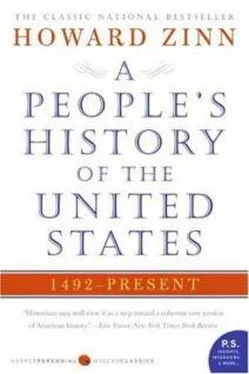Howard Zinn - A People
Здесь есть возможность читать онлайн «Howard Zinn - A People» весь текст электронной книги совершенно бесплатно (целиком полную версию без сокращений). В некоторых случаях можно слушать аудио, скачать через торрент в формате fb2 и присутствует краткое содержание. Издательство: Harper-Collins, Жанр: Фэнтези, на английском языке. Описание произведения, (предисловие) а так же отзывы посетителей доступны на портале библиотеки ЛибКат.
- Название:A People
- Автор:
- Издательство:Harper-Collins
- Жанр:
- Год:неизвестен
- ISBN:нет данных
- Рейтинг книги:4 / 5. Голосов: 1
-
Избранное:Добавить в избранное
- Отзывы:
-
Ваша оценка:
- 80
- 1
- 2
- 3
- 4
- 5
A People: краткое содержание, описание и аннотация
Предлагаем к чтению аннотацию, описание, краткое содержание или предисловие (зависит от того, что написал сам автор книги «A People»). Если вы не нашли необходимую информацию о книге — напишите в комментариях, мы постараемся отыскать её.
A People — читать онлайн бесплатно полную книгу (весь текст) целиком
Ниже представлен текст книги, разбитый по страницам. Система сохранения места последней прочитанной страницы, позволяет с удобством читать онлайн бесплатно книгу «A People», без необходимости каждый раз заново искать на чём Вы остановились. Поставьте закладку, и сможете в любой момент перейти на страницу, на которой закончили чтение.
Интервал:
Закладка:
His phrase "six parts of seaven" suggests the existence of an upper class not so impoverished. In fact, there was such a class already developed in Virginia. Bacon himself came from this class, had a good bit of land, and was probably more enthusiastic about killing Indians than about redressing the grievances of the poor. But he became a symbol of mass resentment against the Virginia establishment, and was elected in the spring of 1676 to the House of Burgesses. When he insisted on organizing armed detachments to fight the Indians, outside official control, Berkeley proclaimed him a rebel and had him captured, whereupon two thousand Virginians marched into Jamestown to support him. Berkeley let Bacon go, in return for an apology, but Bacon went off, gathered his militia, and began raiding the Indians.
Bacon's "Declaration of the People" of July 1676 shows a mixture of populist resentment against the rich and frontier hatred of the Indians. It indicted the Berkeley administration for unjust taxes, for putting favorites in high positions, for monopolizing the beaver trade, and for not protecting the western formers from the Indians. Then Bacon went out to attack the friendly Pamunkey Indians, killing eight, taking others prisoner, plundering their possessions.
There is evidence that the rank and file of both Bacon's rebel army and Berkeley 's official army were not as enthusiastic as their leaders. There were mass desertions on both sides, according to Washburn. In the fall, Bacon, aged twenty-nine, fell sick and died, because of, as a contemporary put it, "swarmes of Vermyn that bred in his body." A minister, apparently not a sympathizer, wrote this epitaph:
Bacon is Dead I am sorry at my heart,
That lice and flux should take the hangmans part.
The rebellion didn't last long after that. A ship armed with thirty guns, cruising the York River, became the base for securing order, and its captain, Thomas Grantham, used force and deception to disarm the last rebel forces. Coming upon the chief garrison of the rebellion, he found four hundred armed Englishmen and Negroes, a mixture of free men, servants, and slaves. He promised to pardon everyone, to give freedom to slaves and servants, whereupon they surrendered their arms and dispersed, except for eighty Negroes and twenty English who insisted on keeping their arms. Grantham promised to take them to a garrison down the river, but when they got into the boat, he trained his big guns on them, disarmed them, and eventually delivered the slaves and servants to their masters. The remaining garrisons were overcome one by one. Twenty-three rebel leaders were hanged.
It was a complex chain of oppression in Virginia. The Indians were plundered by white frontiersmen, who were taxed and controlled by the Jamestown elite. And the whole colony was being exploited by England, which bought the colonists' tobacco at prices it dictated and made 100,000 pounds a year for the King. Berkeley himself, returning to England years earlier to protest the English Navigation Acts, which gave English merchants a monopoly of the colonial trade, had said:
… we cannot but resent, that forty thousand people should be impoverish'd to enrich little more than forty Merchants, who being the only buyers of our Tobacco, give us what they please for it, and after it is here, sell it how they please; and indeed have forty thousand servants in us at cheaper rates, than any other men have slaves…
From the testimony of the governor himself, the rebellion against him had the overwhelming support of the Virginia population. A member of his Council reported that the defection was "almost general" and laid it to "the Lewd dispositions of some Persons of desperate Fortunes" who had "the Vaine hopes of takeing the Countrey wholley out of his Majesty's handes into their owne." Another member of the Governor's Council, Richard Lee, noted that Bacon's Rebellion had started over Indian policy. But the "zealous inclination of the multitude" to support Bacon was due, he said, to "hopes of levelling."
"Levelling" meant equalizing the wealth. Levelling was to be behind countless actions of poor whites against the rich in all the English colonies, in the century and a half before the Revolution.
The servants who joined Bacon's Rebellion were part of a large underclass of miserably poor whites who came to the North American colonies from European cities whose governments were anxious to be rid of them. In England, the development of commerce and capitalism in the 1500s and 1600s, the enclosing of land for the production of wool, filled the cities with vagrant poor, and from the reign of Elizabeth on, laws were passed to punish them, imprison them in workhouses, or exile them. The Elizabethan definition of "rogues and vagabonds" included:
… All persons calling themselves Schollers going about begging, all Seafaring men pretending losses of their Shippes or goods on the sea going about the Country begging, all idle persons going about in any Country either begging or using any subtile crafte or unlawful Games… comon Players of Interludes and Minstrells wandring abroade… all wandering persons and comon Labourers being persons able in bodye using loytering and refusing to worke for such reasonable wages as is taxed or commonly given…
Such persons found begging could be stripped to the waist and whipped bloody, could be sent out of the city, sent to workhouses, or transported out of the country.
In the 1600s and 1700s, by forced exile, by lures, promises, and lies, by kidnapping, by their urgent need to escape the living conditions of the home country, poor people wanting to go to America became commodities of profit for merchants, traders, ship captains, and eventually their masters in America. Abbot Smith, in his study of indentured servitude, Colonists in Bondage , writes:
"From the complex pattern of forces producing emigration to the American colonies one stands out clearly as most powerful in causing the movement of servants. This was the pecuniary profit to be made by shipping them."
After signing the indenture, in which the immigrants agreed to pay their cost of passage by working for a master for five or seven years, they were often imprisoned until the ship sailed, to make sure they did not run away. In the year 1619, the Virginia House of Burgesses, born that year as the first representative assembly in America (it was also the year of the first importation of black slaves), provided for the recording and enforcing of contracts between servants and masters. As in any contract between unequal powers, the parties appeared on paper as equals, but enforcement was far easier for master than for servant.
The voyage to America lasted eight, ten, or twelve weeks, and the servants were packed into ships with the same fanatic concern for profits that marked the slave ships. If the weather was bad, and the trip took too long, they ran out of food. The sloop Sea-Flower , leaving Belfast in 1741, was at sea sixteen weeks, and when it arrived in Boston, forty-six of its 106 passengers were dead of starvation, six of them eaten by the survivors. On another trip, thirty-two children died of hunger and disease and were thrown into the ocean. Gottlieb Mittelberger, a musician, traveling from Germany to America around 1750, wrote about his voyage:
During the journey the ship is full of pitiful signs of distress-smells, fumes, horrors, vomiting, various kinds of sea sickness, fever, dysentery, headaches, heat, constipation, boils, scurvy, cancer, mouth-rot, and similar afflictions, all of them caused by the age and the high salted state of the food, especially of the meat, as well as by the very bad and filthy water… Add to all that shortage of food, hunger, thirst, frost, heat, dampness, fear, misery, vexation, and lamentation as well as other troubles… On board our ship, on a day on which we had a great storm, a woman ahout to give birth and unable to deliver under the circumstances, was pushed through one of the portholes into the sea…
Читать дальшеИнтервал:
Закладка:
Похожие книги на «A People»
Представляем Вашему вниманию похожие книги на «A People» списком для выбора. Мы отобрали схожую по названию и смыслу литературу в надежде предоставить читателям больше вариантов отыскать новые, интересные, ещё непрочитанные произведения.
Обсуждение, отзывы о книге «A People» и просто собственные мнения читателей. Оставьте ваши комментарии, напишите, что Вы думаете о произведении, его смысле или главных героях. Укажите что конкретно понравилось, а что нет, и почему Вы так считаете.












